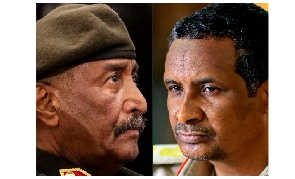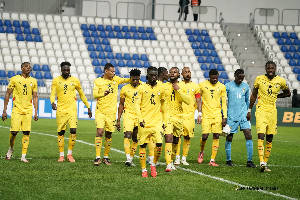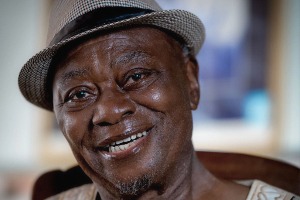Leaders of Sudan’s warring factions are headed for the first face-to-face meeting between them, signalling a first pathway to ending the brutal conflict in the country.
The Intergovernmental Authority on Development (Igad), the regional bloc in the Horn of Africa, said on Sunday that Mohamed Hamdani Daglo ‘Hemedti’, the leader of the Rapid Support Forces (RSF), had agreed to meet with the nemeses in Sudan Armed Forces (Saf) led by Abdel Fattah al-Burhan.
If the two leaders meet, it would be the first time since the war broke out on April 15, killing at least 7,500 and sending more than 5.4 million people in displacement so far. But there were no definite dates yet on when the meeting will happen.
Igad heads of state and government, after their summit on Saturday, said they had placed a telephone call with Hemedti. They said they appreciated “his acceptance of the proposals of the assembly for an unconditional ceasefire, resolution of the conflict through political dialogue and the holding of a one-to-one meeting with the commander of the Saf with the facilitation of Igad.”
Burhan and Hemedti, once allies in the Sudan transition, later fell out on how it should pan out. At the Igad meeting in Djibouti, leaders however said Sudan’s long-term peace does not just bank on the two protagonists but every other political and armed stakeholder in the country.
Igad said it will “fast-track efforts” in organising an Igad-AU facilitated “all-inclusive Sudanese-owned and Sudanese-led civilian dialogue aimed at forging national consensus towards the formation of a civilian-led transition that will culminate in the holding of open, transparent and democratic elections.”
Igad agreed to create a framework made up of respected diplomatic and political interlocutors who will be nominated by heads of government to undertake mediation efforts in Sudan. The bloc includes Sudan, Kenya, Ethiopia, Djibouti, Eritrea, South Sudan, Somalia and Uganda.
While the bloc is also due to name a Special Envoy for Sudan, it was unclear whether the quartet of countries that initially attempted mediation in Sudan will continue. Those countries included Kenya, Ethiopia, South Sudan and Djibouti. Sudan had refused Kenya’s lead role in it although Burhan and Kenyan President William Ruto have since, publicly, reconciled their views. The Summit said “The Quartet had ably discharged the task for which it was established…”
At the Igad Summit, leaders condemned unnamed external entities for fueling the war through “unwarranted interventions and interferences” by providing and re-supplying war assets and materiel to either side of the conflict.
Since the war began, Sudan’s various allies have attempted parallel peace bids, all of which have mostly failed as parties refused to honour ceasefire agreements and provisions for humanitarian corridors.
One such bid was under the Jeddah Peace Process, initially fronted by the US and Saudi Arabia but now includes the AU and Igad. In November, Saf and RSF pledged to open humanitarian corridors and open direct channels of communication. It didn’t happen.
Igad says there should be a “consolidation and coalescing of efforts under the Igad-AU led process to chart a unified and coordinated pathway to Peace under the Igad Roadmap, which it wants the AU and the UN Security Council to endorse.
“(Igad Summit) called for a unified Africa-anchored mediation process that coordinates the various national, regional, continental and international efforts and tracks under the auspices of Igad and the AU.”
Meanwhile, Saf on Sunday admitted to firing on Red Cross workers, killing at least two and wounding seven others.
The Sudanese army said in a statement that it shot on the Red Cross mission because the aid workers had violated an agreed-upon path during an evacuation of foreigners from St Mary’s Church in the Al-Shajara neighborhood, south of Khartoum.
The army stated that the organisation's employees entered the area from the southern direction instead of the north.
The International Committee of the Red Cross said that it was horrified by the deliberate attack on a humanitarian convoy in Khartoum today.
“The humanitarian convoy, consisting of three ICRC vehicles and three buses, all marked with the Red Cross emblem, was due to evacuate over a hundred vulnerable civilians from Khartoum to Wad Madani when it came under attack upon entering the evacuation area,” the Committee said.
“The humanitarian operation had been requested by and coordinated with the parties to the conflict, who gave their agreement and provided the necessary security guarantees”.
“This attack is unacceptable, and we are grief-stricken", said Pierre Dorbes, the head of the ICRC delegation in Sudan.
“I am shocked by the total disrespect for the Red Cross emblem, which must be respected and protected in accordance with international humanitarian law. Our mission today was to bring these civilians to safety. Instead, lives have been tragically lost. My heart goes out to the loved ones of the people killed, and we desperately hope those injured will make a full recovery.”
Lack of ceasefire and proper humanitarian corridors has seen at least 22 aid workers killed in Sudan since the war, according to a tally by charity group CARE International, making Sudan one of the deadliest places for humanitarian workers in Africa.
Africa News of Tuesday, 12 December 2023
Source: theeastafrican.co.ke













